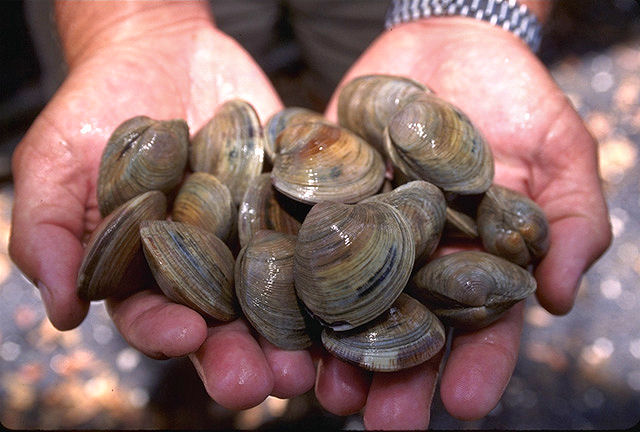|
| 질의: island major | 결과: 44번째/128 | |
Quahog, Hard Clam (Mercenaria mercenaria) - Wiki
| 제목: | Quahog, Hard Clam (Mercenaria mercenaria) - Wiki
| |

| 해상도: 640x432
파일크기: 64737 Bytes
등록시간: 2007:10:29 10:12:41
|
ERROR : Server Busy(-1105)
ERROR : Server Busy(-1105)
Quahog, Hard Clam (Mercenaria mercenaria) - Wiki
Hard clam
From Wikipedia, the free encyclopedia
[Photo] Espa??ol: Almejas (Mercenaria mercenaria). Little neck clams ((Phylum Mollusca - Class Bivalvia - Order Veneroida - Family Veneridae). Photographer: Ken Hammond. Source: http://www.usda.gov/oc/photo/96cs1862.htm
The hard clam or quahog, Mercenaria mercenaria is a bivalve mollusc native to the eastern shores of North America, from Prince Edward Island to the Yucat??n Peninsula. Older sources may give it the systematic name Venus mercenaria. It is one of many unrelated bivalves referred to as clams.
Distribution
Hard clams are quite common throughout New England, north into Canada, and all down the Eastern seaboard of the United States to Florida, but are particularly abundant between Cape Cod and New Jersey, where seeding and harvesting them is an important commercial form of aquaculture; for example, the species is an important member of the suspension-feeding, benthic fauna of the lower Chesapeake Bay, while tiny Rhode Island, situated right in the middle of "quahog country," has supplied a quarter of the USA's total annual commercial quahog catch. The quahog shell is the Rhode Island state shell. The species has also been introduced and is farmed on the Pacific coast of North America and in Great Britain and continental Europe. It reproduces sexually.
Longevity
In October 2007 researchers from Bangor University in North Wales determined that an ocean quahog clam was aged between 405 and 410 years by counting rings on its shell. The clam was in its infancy when Queen Elizabeth I was on the throne and Shakespeare was writing plays such as Othello and Hamlet.
Alternative names
The hard clam has many alternative names in addition to quahog. It is also known as the Northern quahog, round clam, or chowder clam. Furthermore, in fishmarkets there are specialist names for different sizes of hard clam. The smallest clams are called countnecks, next size up are littlenecks, then topnecks. Above that are the cherrystones, and the largest are called quahogs or chowder clams.
Of all these names, the most distinctive is quahog (pronounced "KO-hog", IPA /koh????/ or "kwa-HOG" IPA /kw??h????/. This name comes from the Narragansett word "poquauhock" (the word is similar in Wampanoag and some other Algonquian languages). As New England Indians made valuable beads called wampum from the shells (especially the purple color), the species name mercenaria is related to the Latin word for "money."
Many areas where aquaculture is highly important have bred specialized versions of these clams, in an attempt to distinguish themselves in the marketplace. These clams are in every way the same as others, except that their shells bear distinctive markings; for example those from Wellfleet, Massachusetts have pronounced wavy or zigzagging lines on their shells, which are meant to be reminiscent to a line of Ws running across the shell ??? an attempt to capitalize on the town's reputation for oysters. As of late, those that have been specially bred with markings have been breeding with wild stocks, so it is not uncommon for wild clams to have these markings.
QPX
QPX, otherwise known as Quahog Parasite Unknown, is a parasite that affects Mercenaria. While little is known about the disease, research is currently underway in several laboratories, fueled by the need to inform aquaculturists, who suffer financially because of the mortality rates in clams that QPX inflicts and the ensuing years in which runs must be left fallow to clear the disease.
Culinary use
In coastal areas of New England, restaurants known as raw bars specialize in serving littlenecks and topnecks raw on an opened half-shell, usually with a cocktail sauce with horseradish, and often with lemon. Sometimes, littlenecks are steamed and dipped in butter, though not as commonly as their soft-shelled clam cousin, the "steamer." Littlenecks are often found in-the-shell in sauces, soups, stews, "clams casino" or substituted for European varieties such as the cockle in southern European seafood dishes. The largest clams, quahogs or chowders and cherrystones (with the toughest meat), are used in such dishes as clam chowder and stuffed clams or are minced and mixed into dishes that use the smaller, more tender clams.
Clams and red tide
The term "red tide" refers to an accumulation of a toxin produced by marine algae. Filter-feeding shellfish ??? such as clams, oysters, and mussels ??? are affected. The toxin affects the human central nervous system. Eating contaminated shellfish, raw or cooked, can be fatal.
Some algal blooms make the seawater appear red, but red tide blooms do not always discolor the water nor are they related to tides.
Clams bought from a market should always be safe as commercial harvesters are extremely careful about red tides: They close beds that are even remotely threatened and keep them closed for up to three or four weeks after they are clean of any red tide. Any commercial clam fisher who breaks these rules is in line for a major fine in the first instance and will most likely have their license to harvest or sell clams revoked; furthermore they are liable for any damages.
Popular culture references
The animated television show Family Guy takes place in the fictional town of Quahog, Rhode Island, where the clam is the official mascot. The bar where Peter Griffin, Glenn Quagmire, Cleveland Brown, and Joe Swanson hang out is named The Drunken Clam.
http://en.wikipedia.org/wiki/Hard_clam
| The text in this page is based on the copyrighted Wikipedia article shown in above URL. It is used under the GNU Free Documentation License. You may redistribute it, verbatim or modified, providing that you comply with the terms of the GFDL. |
|
^o^
동물그림창고 똑똑전화 누리집
^o^
|
|